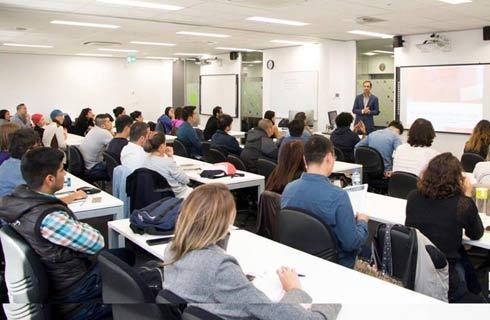- IDP China>
- 课程库>
- 教育学>
- 教育>
- 课程与教学>
- Doctor of Philosophy in Curriculum and Instruction - Cultural Studies, International Education, and Multicultural Education
课程和教学哲学博士-文化研究,国际教育和多元文化教育(CSIEME)
Doctor of Philosophy in Curriculum and Instruction - Cultural Studies, International Education, and Multicultural Education

学历文凭
Ph.D.

专业院系
Department of Teaching & Learning

开学时间

课程时长

课程学费

国际学生入学条件
IDP—雅思考试联合主办方

雅思考试总分
6.5
- 雅思总分:6.5
- 托福网考总分:80
- 托福笔试总分:160
- 其他语言考试:Pearson Test of English (PTE) - Minimum score: 65
CRICOS代码:
申请截止日期: 请与IDP联系 以获取详细信息。
课程简介
Graduate students in the CSIEME program are engaged in developing academic knowledge and practical expertise in the cultural, international, and multicultural dimensions of educational praxis including, but not limited to, inquiry into student learning; pedagogy; curriculum development, design, and implementation; teaching and learning reciprocity; educational assessment and evaluation; media and visual arts; popular culture; literacy, new literacies (technology), and textuality; locality, transnationalism, and globalization; and, equity and social justice in relationship to both individualself and collectivesocial formation. This specialization requires student engagement with issues of race; color; ethnicity; geographic origin; immigration status; language; caste; socioeconomic class background; employment status; sex; gender; gender identity and expression; family configuration; sexual orientation; physical, developmental, or psychological ability; age or generation; religious, spiritual, faith-based, or secular belief; among other dimensions of difference as these manifest in educational contexts. Research in this emphasis area requires students to develop comprehensive understanding of-among other interpretive stances, frameworks, and communities-critical theory, critical race theory, post-positivist paradigms, constructivist and constructionist theory, and postmodern theory.<br><br>The Cultural Studies, International Education, and Multicultural Education (CSIEME) concentrations are comprised of three related disciplinary strands that promote interdisciplinary and decolonizing approaches to research and teaching.<br><br>Multicultural Education is the core strand. Multicultural Education engages critical pedagogy as the basis for social change through promotion of the democratic principles of social justice.<br><br>Through enactment of critical pedagogy focused on knowledge, reflection, and action (praxis), Multicultural Education accepts and affirms—through radical transformation of interpersonal interactions, curricula, and instructional strategies—the pluralism that students, their families and communities, and educators represent.
相关申请
 预科
预科 奖学金
奖学金 实习机会
实习机会 在校学习
在校学习 跨境学习
跨境学习 校园授课-线上开始
校园授课-线上开始 在线/远程学习
在线/远程学习
开学时间&学费
学费信息仅供参考,请与IDP联系以获取详细信息
| 开学时间 | 时长 | 学费 | 地点 |
|---|---|---|---|
| 暂无 | 暂无 | 暂无 | 暂无 |
学校排名

世界排名601
数据源:
泰晤士高等教育世界大学排名
关于内华达大学拉斯维加斯分校

内华达大学拉斯维加斯分校(UNLV)成立于1957年,至今已发展成为美国领先的研究机构和高等教育中心之一。大学拥有超过25000名本科生,其中许多学生是家里第一代大学生--他们父母之前都没有获得过大学学位。该大学以其多样性而闻名--有来自85个国家/地区的超过1000名国际学生在该机构就读。该分校还有100多个文化、种族或宗教性质的学生组织,学生可以在这些组织中认识类似背景的人,帮助学生感到更融入。学生们身处于拉斯维加斯热闹的气氛中,大学确保那些希望住在校园或附近的学生有很多令人兴奋的机会。对于想要宁静景观的学生来说,坐短途汽车就可以欣赏沙漠景观,为他们提供远离城市灯光的足够的休息空间。该大学有16个主要学院,提供广泛的学习课程选择。该大学还以其 ''酷学术"科目而闻名--最现代的专业或学习领域的组合,确保学生处于现代学习的最前沿。UNLV不仅仅有优秀的教学质量,而且还采用多样化的现代方法,确保学生处于所选领域的最前沿。该大学的学生支持服务非常优秀,各种服务确保学生不会因为个人问题而分散学习精力。该大学还为任何关心教育对财务影响的人提供了很高的性价比-2020-2021年,87%的UNLV本科生获得了财政援助和奖学金。
本校相关课程
其他相关课程

教育理论与实践哲学博士:课程与教育学流
 西蒙菲莎大学
西蒙菲莎大学学历文凭
Ph.D.
开学日期
课程费用总额


课程与学习文学硕士
 卡尔加里大学
卡尔加里大学学历文凭
Masters Degree
开学日期
课程费用总额


课程与学习哲学博士
 卡尔加里大学
卡尔加里大学学历文凭
Ph.D.
开学日期
课程费用总额


课程研究哲学博士
 不列颠哥伦比亚大学
不列颠哥伦比亚大学学历文凭
Ph.D.
开学日期
课程费用总额


课程研究文学硕士
 不列颠哥伦比亚大学
不列颠哥伦比亚大学学历文凭
Masters Degree
开学日期
课程费用总额


课程研究教育硕士
 不列颠哥伦比亚大学
不列颠哥伦比亚大学学历文凭
Masters Degree
开学日期
课程费用总额










 美国
美国





